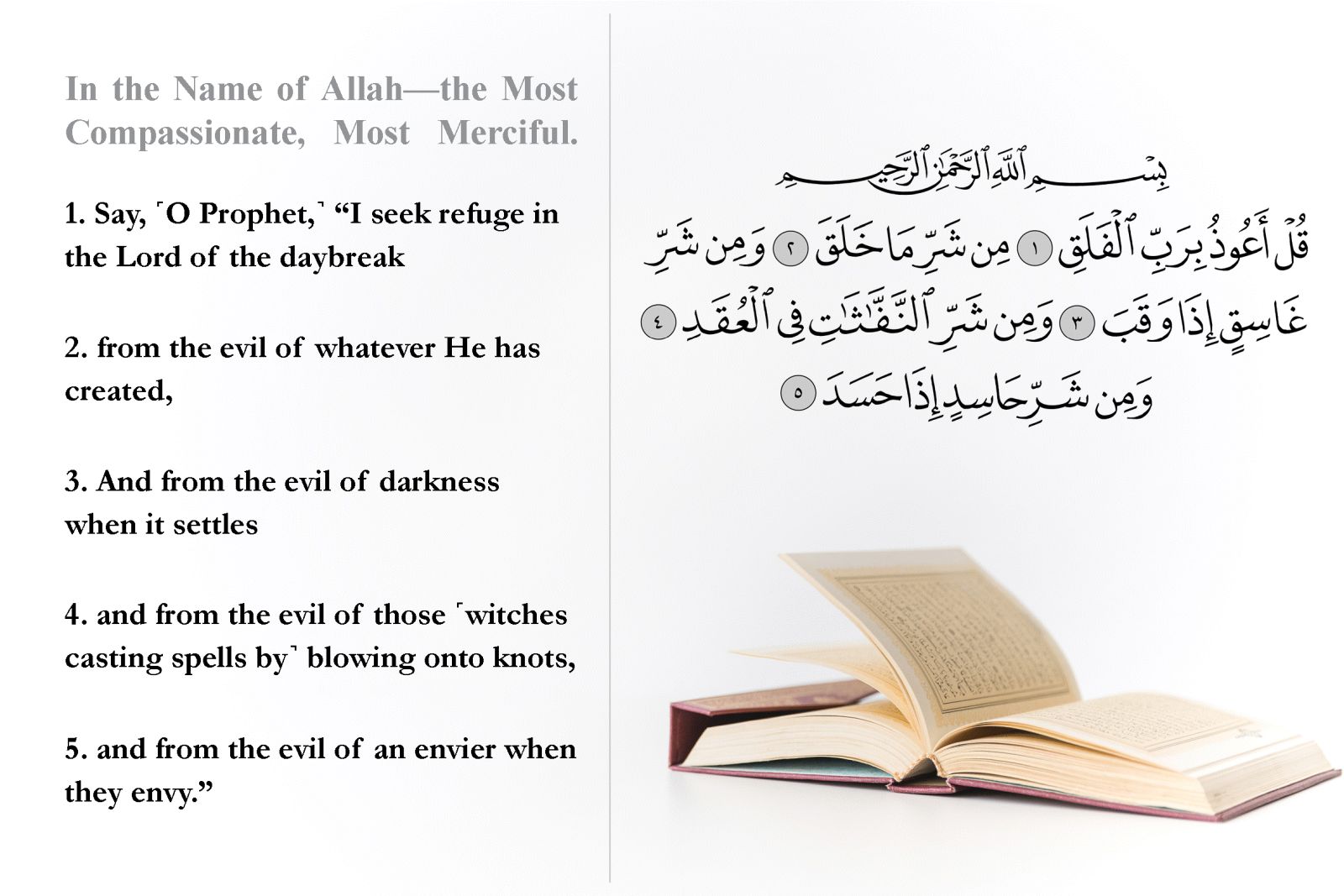“…Water, water everywhere, Nor any drop to drink.”
These are the last two lines from the poem “The Rime of the Ancient Mariner,” by Samuel Taylor Coleridge; a matchless masterpiece that has never failed to bring tears to my eyes.
These two lines show the speaker’s incapacity to find a fresh drop of water to drink while he is in the midst of a heavy, salty sea.
Likewise, evil might be everywhere and one can, or cannot, find a refuge against it, depending on whom you are relying on!
Indeed, many are the evils around us. While you love to perform good deeds and be useful to others in your neighborhood or community, there are others who do not share with you the same concept; they may seek to hurt others. These are the bad fellows, witches, the envious, and the like.
Given this, Allah the Almighty teaches us, in the Qur’an, to seek refuge in Him against evil of every kind.
He, Glory be His, directs us, in Surah Al-Falaq – which was revealed in Makkah – to come closer to Him if we want to be protected against all forms and degrees of evil. It teaches us to seek refuge with Allah the Almighty from four evils that will be illuminated below.

Arabic text and translation of the meaning of Surat Al-Falaq (Quran 113)
Listen to recitation of Surat Al-Falaq by Sheikh Abdul Karim Ad-Daghush, Egypt
The Surah’s Overall Theme and Key Terms
Allah the Almighty directs us to seek refuge in Him, as He is the Lord and Creator of Al-Falaq, an ambiguous term meaning either the daybreak, or the whole creation, with reference to everything springing forth into life, against the following evils:
1. From the evil of anything that He created, such as Satan and his progeny, or the evil aspect of any creation.
We are ordered to seek refuge with Allah the Almighty against such evil so that the good in these creatures is encouraged to remain, while we are unharmed by their evil side.
2. From the evil of the Ghasiq idha waqab; the darkness when it settles and overtakes daylight.
This means the dark night which fills our hearts with awe, uneasiness, and fear from the unknown or the unexpected, be it an enemy, a beast, a wild idea, an unlawful lust, anxiety or excessive worry.
Evil lurks in places you would never imagine and tries to charm its way into your life.
{ Say, ˹O Prophet,˺ “I seek refuge in the Lord of the daybreak
from the evil of whatever He has created,
and from the evil of the night when it grows dark,} (Al-Falaq 113: 1 – 3)
3. From the evil of the An-Naffathat fil `uqad – meaning, the blowers in knots, or the conjuring witches.
These witches existed in Arabia centuries ago and used to tie knots in cords and blow upon them with an intention to inflict harm upon someone.
Some types of magic can be harmful; but such harm cannot happen except if Allah lets it to take effect (Al-Baqarah 2:102). Seeking Allah’s protection is the best precaution you can take to ward off such evil.
In some other cases, magic is mere production of illusions. It does not alter the nature of things or their essence. It is subject to the magician’s design as s/he tries to deceive onlookers to let them see what s/he wants them to see.
We understand this from the story of Prophet Musa (Moses) with Pharaoh’s magicians as the Qur’an says, {And by the power of their magic, their cords and staffs appeared to him as though they were running} (Taha 20:66).”
As their cords and staffs did not actually turn into snakes; it was only that they deceived the onlookers, including Prophet Musa himself. But when he threw his staff, it actually turned into a real snake which devoured their cords and staffs.
Realizing the fact that this was not deception of any sort, the magicians themselves turned their faces and hearts towards Allah and believed in Prophet Musa and his divine mission.
4. From the evil of an envier when he envies.
Envy is the malignant dislike that someone should possess a blessing that you yourself do not possess, or that someone is better than you in one or more aspects.
But envy does not stop there as the one who covets wants that blessing to be removed from the other person and/or to be transferred from the other to his/her self.
Remarkably, envy is different from Ghibtah which is a “decent envy.” In Ghibtah, one is totally content with what Allah the Almighty has granted, feels happy for others, and at the same time wants them to keep the blessings bestowed upon them, and asks Allah the Almighty to grant him a similar blessing.
The Prophet (peace and blessings be upon him) is reported to have said,
“Envy is justified in two cases only:
a man whom Allah has given knowledge of the Qur’an, and so he recites it during the night and during the day;
and a man whom Allah has given wealth and so he spends from it during the night and during the day.” (Al-Bukhari and Muslim)
A Final Word
It has been reported from Abu Sa`id that the Messenger of Allah used to seek protection against the evil eyes of the Jinn and mankind. But when the Mu`awwidhatayn [Surahs An-Nas and Al-Falaq] were revealed, he used them (for protection) and abandoned all else besides them. (At-Tirmidhi, An-Nasa’i and Ibn Majah)
Although evil may be everywhere – even around the corner – Allah the Almighty does not leave us alone; deprived of all guards and shields. He, Glory be His, teaches and guides us to seek refuge in Him for absolute protection against any and every kind of evil.
So, FLEE TO ALLAH!

